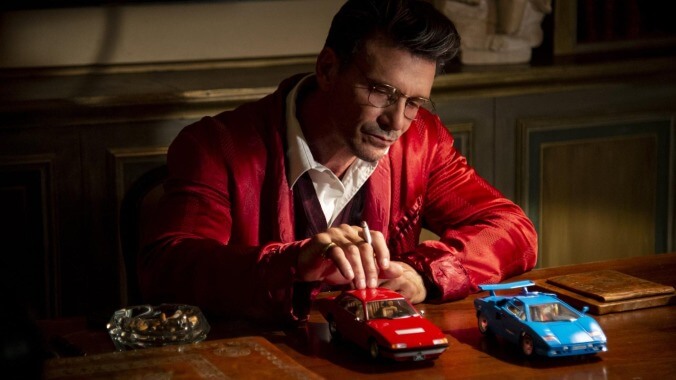In Lamborghini: The Man Behind The Legend, there's nothing under the hood
Despite a sturdy performance by Frank Grillo, Bobby Moresco’s biopic of the luxury car designer is all smooth surfaces and no actual muscle

Usually, with a biopic, one immediately understands why a famous person’s life is worthy of a film. Either the person has held people’s imagination, or their story has become culturally significant. Sometimes a filmmaker finds an absorbing but lesser-known chapter in someone’s life that acts as a hook into a story. None of these things exist in Bobby Moresco’s Lamborghini: The Man Behind The Legend. We never understand why a movie about the Italian automobile designer and engineer was made. What part of his legacy or life inspired Moresco? This is anonymous filmmaking of the highest order—it could be about anyone. There’s no insight into Ferruccio Lamborghini or what made his pursuits special. It could also be directed by anyone—Moresco’s indistinct filmmaking is neither enthralling nor involving.
The film starts in the 1960s with middle-aged Lamborghini (played by Frank Grillo) engaged in a closed-circuit car race with Enzo Ferrari (Gabriel Byrne). Perhaps Moresco is setting up a rivalry between the two Italian automobile titans? But before we understand what’s going on, the film jumps back to the end of WWII, when a younger Lamborghini (played by Romano Reggiani) returned from battle to his father’s farm. He tries helping by building tractors, evidencing his interest in being a mechanic. A friendship and shared engineering passion develops with Matteo (Matteo Leoni), a fellow soldier. He falls in love with a beautiful woman, Celia (Hannah van der Westhuysen).
Bland as these early scenes are, they are not helped by the younger actors, who give leaden performances that make conversations about car engines and bank loans somehow sound even duller. Even when tragedy strikes, the film remains emotionally opaque. And then a stupid romantic rivalry is introduced to tell us that Lamborghini is—what? Selfish? Maniacally driven even at a cost to those closest to him? It’s unclear.
Things perk up a bit when Grillo takes over the part about halfway through. He brings charisma and a certain “je ne sais quoi” that makes him immensely watchable. Unfortunately, like the other actors, he’s stuck speaking English with an Italian accent, a misguided choice that makes most scenes laughable. Grillo doesn’t seem particularly invested in the accent, which comes and goes. So why not ditch it altogether? It’s not like the characters actually spoke English in their real lives.
 Keep scrolling for more great stories.
Keep scrolling for more great stories.
